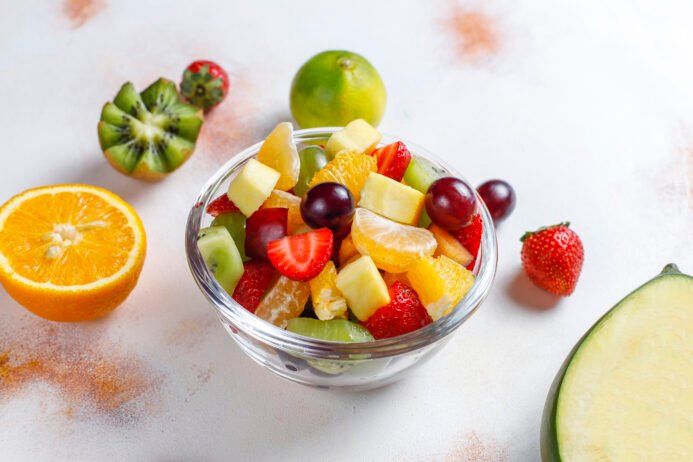Fruit is often hailed as nature’s candy—sweet, nutritious, and packed with vitamins, minerals, and fiber. But with its natural sugars, many wonder if eating too much fruit could lead to a sugar imbalance, such as blood sugar spikes, insulin resistance, or other metabolic issues. This article dives into the science behind fruit consumption, sugar imbalances, and how to enjoy fruit in a balanced way.
Understanding Sugar in Fruit
Fruits contain natural sugars, primarily fructose, along with glucose and sucrose in varying amounts. Unlike added sugars in processed foods, the sugars in fruit come with fiber, water, and micronutrients that slow digestion and absorption, reducing the likelihood of rapid blood sugar spikes. For example:
- Fructose: Processed mainly by the liver, fructose doesn’t directly spike blood sugar but can contribute to fat accumulation if consumed in excess.
- Glucose: Directly affects blood sugar levels, but the fiber in whole fruit slows its absorption.
- Fiber: Slows digestion, stabilizes blood sugar, and promotes satiety.
A medium apple (about 182 grams) contains roughly 19 grams of sugar and 4 grams of fiber, while a can of soda (355 ml) has about 39 grams of added sugar with no fiber. This difference highlights why fruit is generally a healthier choice than sugary processed foods.


What Is a Sugar Imbalance?
A sugar imbalance typically refers to disruptions in blood sugar regulation, which can manifest as:
Blood sugar spikes and crashes: Rapid rises in blood glucose followed by sharp drops, leading to fatigue, irritability, or hunger.
Insulin resistance: When cells become less responsive to insulin, causing elevated blood sugar levels over time.
Hypoglycemia: Low blood sugar, often causing shakiness, sweating, or confusion.
Metabolic issues: Long-term imbalances may contribute to conditions like type 2 diabetes or fatty liver disease.
These issues are often linked to diets high in refined sugars and low in fiber, but could fruit’s natural sugars play a role?
Can Eating Too Much Fruit Cause a Sugar Imbalance?
The short answer is: it’s unlikely for most people, but it depends on quantity, individual health, and context. Let’s break it down:


1. Moderation Is Key
For healthy individuals, eating fruit in reasonable amounts (2–3 servings per day, as recommended by dietary guidelines like those from the USDA) is unlikely to cause sugar imbalances. The fiber, water, and nutrients in whole fruit help regulate blood sugar. However, consuming excessive amounts—say, 10+ servings daily—could lead to:
Excess calorie intake: Fruits are calorie-dense compared to vegetables, and overeating them may contribute to weight gain, which can impair insulin sensitivity.
High fructose load: Large amounts of fructose (e.g., from eating multiple bananas or mangoes daily) may stress the liver, potentially leading to fat buildup and insulin resistance over time.
Blood sugar fluctuations: While less dramatic than with refined sugars, eating large quantities of low-fiber, high-sugar fruits (like grapes or pineapple) could cause mild blood sugar spikes, especially if eaten alone on an empty stomach.
2. Individual Health Matters
Certain groups may need to be more cautious:
People with diabetes or prediabetes: Those with impaired blood sugar regulation may experience spikes from high-sugar or high-glycemic fruits (e.g., ripe bananas, with a glycemic index of 60–70). Pairing fruit with protein or fat (like nuts) can help.
Individuals with insulin resistance or metabolic syndrome: Excessive fructose from fruit could contribute to liver fat accumulation, worsening insulin sensitivity.
People with fructose malabsorption: Some individuals poorly absorb fructose, leading to bloating, diarrhea, or discomfort when eating too much fruit.
3. Type of Fruit Matters
Not all fruits are equal in their sugar content or glycemic impact:
- Low-glycemic fruits: Berries, apples, and pears have lower sugar and higher fiber, making them less likely to cause blood sugar spikes.
- High-glycemic fruits: Bananas, mangoes, and grapes have higher sugar and lower fiber, potentially affecting blood sugar more if eaten in large amounts.
- Dried fruit and juices: These are concentrated sources of sugar with less fiber. For example, a cup of raisins (145 grams) has about 86 grams of sugar, compared to a cup of grapes (151 grams) with 23 grams. Fruit juices, even 100% natural ones, lack fiber and can spike blood sugar quickly.
4. Context of Your Diet
Fruit doesn’t exist in a vacuum. If your overall diet is high in refined carbs, added sugars, or processed foods, adding large amounts of fruit could exacerbate blood sugar issues. A balanced diet with vegetables, lean proteins, healthy fats, and whole grains provides a buffer, allowing fruit to fit into a healthy eating pattern without causing imbalances.
Signs You Might Be Overdoing Fruit
If you’re concerned about eating too much fruit, watch for these signs:
- Frequent hunger or energy crashes: Could indicate blood sugar fluctuations from high-sugar fruits.
- Weight gain: Excess calories from fruit could contribute if you’re eating beyond your needs.
- Digestive issues: Bloating or diarrhea might suggest fructose overload or malabsorption.
- Elevated triglycerides: Excessive fructose may increase blood triglycerides, a risk factor for heart disease.
If you notice these, consult a healthcare provider or dietitian to assess your diet and health.
How to Enjoy Fruit Without Causing a Sugar Imbalance
You don’t need to avoid fruit to maintain stable blood sugar. Follow these tips:
- Stick to 2–4 servings daily: A serving is about one medium fruit (e.g., an apple) or 1 cup of berries. The American Diabetes Association suggests 15–20 grams of carbs per serving as a guide.
- Choose whole fruits over juices or dried fruit: Whole fruits retain fiber, which slows sugar absorption.
- Pair with protein or fat: Combine fruit with Greek yogurt, nuts, or cheese to stabilize blood sugar.
- Opt for low-glycemic fruits: Berries, cherries, apples, and citrus fruits are great choices.
- Spread intake throughout the day: Avoid eating all your fruit in one sitting to prevent sugar spikes.
- Monitor portion sizes: Use a measuring cup for high-sugar fruits like grapes or mangoes to avoid overeating.
- Balance your diet: Ensure your meals include vegetables, whole grains, and lean proteins to support overall blood sugar control.
Sample Day with Balanced Fruit Intake
Here’s an example of how to incorporate fruit sensibly:
- Breakfast: Greek yogurt with ½ cup blueberries and a sprinkle of chia seeds.
- Snack: One medium apple with a tablespoon of almond butter.
- Lunch: Salad with grilled chicken, mixed greens, and ½ cup sliced strawberries.
- Snack: A small orange with a handful of walnuts.
- Dinner: Baked salmon, quinoa, and steamed broccoli (no fruit here to balance the day).
This provides 2–3 servings of fruit, spread out, and paired with other nutrients for stable blood sugar.
What the Research Says
Studies generally support fruit consumption as part of a healthy diet:
- A 2017 study in The Lancet found that moderate fruit intake (about 2–3 servings daily) was associated with lower risks of heart disease and type 2 diabetes.
- A 2013 meta-analysis in The British Medical Journal showed that whole fruit consumption, unlike fruit juice, did not increase diabetes risk and may even lower it due to fiber and antioxidants.
- However, excessive fructose intake (from any source, including fruit) has been linked to liver fat accumulation in studies like one from The American Journal of Clinical Nutrition (2013), particularly in high-calorie diets.
For most people, whole fruit in moderation is beneficial, not harmful.
Final Thoughts
Eating too much fruit is unlikely to cause a sugar imbalance for most healthy individuals, especially if you stick to whole fruits, moderate portions, and a balanced diet. However, overdoing high-sugar or low-fiber fruits, especially for those with diabetes, insulin resistance, or fructose malabsorption, could contribute to blood sugar fluctuations or other issues. Focus on variety, pair fruits with protein or fat, and listen to your body. If you’re unsure about your fruit intake or experiencing symptoms, consult a healthcare professional or dietitian for personalized advice.
Enjoy fruit as part of a colorful, nutrient-rich diet—it’s one of nature’s best gifts!


